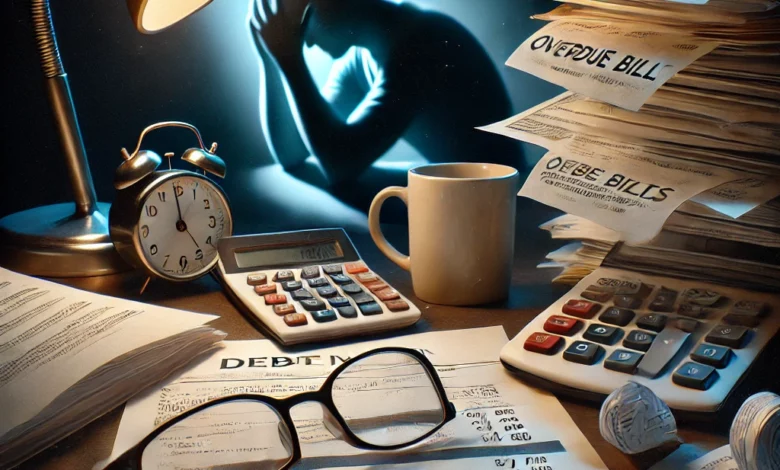
Dreams have always been a window into our subconscious, a realm where the mind speaks a language cloaked in symbols and metaphors. The debt dream is a recurring theme for many, often leaving the dreamer with a feeling of anxiety upon waking. But what could these dreams signify? Delving into the debt dream meaning can be quite revealing, uncovering layers of our psyches that are occupied with notions of obligation, guilt, and the complex relationships we have with money.
Debt Dream Meaning and Interpretations
When we peel back the layers of a debt dream, we discover a rich tapestry of personal, psychological, and sometimes societal symbolism. Let’s delve deeper into some of the varied interpretations that can be derived from such dreams:
- Emotional or Psychological Debt:
- Feelings of Guilt: These dreams might represent guilt or a sense of responsibility you’re carrying around. Perhaps you owe someone an apology or a favor returned.
- Relationship Strains: Owing someone in your dream could mirror a real-life relationship where you feel you’re not giving enough or are taking too much.
- Unfinished Business: Dreams of unresolved debt may indicate unfinished projects or unresolved issues in your life.
- Financial Anxiety:
- Stress Over Personal Finances: If you are experiencing financial strain, dreams of debt are often a literal manifestation of real-world money worries.
- Fear of Inadequacy: Such dreams may also reflect a fear of not living up to your own financial goals or societal standards.
- Sense of Duty and Obligation:
- Professional Responsibilities: Dreaming of debt could be tied to your work life, perhaps suggesting you feel you’re not meeting your own expectations or those of your employer.
- Personal Obligations: It may also signify that you’re feeling overwhelmed by personal duties, to your family, friends, or community.
- Freedom and Liberation:
- Desire to Break Free: Interestingly, debt in a dream might also signal a desire to be freed from constraints and to seek a life of greater autonomy.
- Relief from Burdens: Repaying or resolving debt in a dream can signify the dreamer’s subconscious wish to resolve conflicts and feel psychologically liberated.
- Fear of Consequences:
- Avoidance of Accountability: Dreams where you’re running from debt collectors could indicate a fear of facing the consequences of your actions.
- Apprehension About the Future: Such dreams may also be a manifestation of anxiety about what lies ahead, particularly in times of uncertainty.
In dissecting the debt dream meaning, one must also consider the context in which the debt appears:
- The Source of the Debt:
- If the creditor is known to you, it might represent an actual relationship where you feel you owe something.
- If the creditor is faceless or a vague entity, it could symbolize a broader sense of societal pressure or obligation.
- The Nature of the Debt:
- A large, unmanageable debt in a dream could illustrate feelings of being overwhelmed by life’s demands.
- A small or manageable debt might highlight concerns about details or minor worries that are occupying your mind.
- The Outcome of the Debt:
- If the dream ends with the debt being paid off, it may indicate a subconscious drive towards resolving issues and finding closure.
- If the debt grows or becomes more daunting, it could signify escalating worries or a sense of helplessness in your waking life.
Each aspect of the debt dream can offer a different nuance to the interpretation. It’s essential to remember that dreams use the language of symbols to communicate complex emotions and situations that may not be immediately obvious in our waking lives. By contemplating these meanings, we can better understand our desires, fears, and the various dimensions of our lives that may need attention or reassessment.
What are common Debt dreams?
The theme of debt in dreams can surface in numerous scenarios, each with its own narrative and potential meaning. Below are some common debt dreams and their possible interpretations, weaving together the financial, emotional, and symbolic debts we may encounter in our subconscious minds:
- Being Chased by Debt Collectors:
- Fear of facing up to past actions or responsibilities.
- Running away from obligations or confrontations in waking life.
- Finding a Forgotten Bill:
- Unexpected responsibilities surfacing in your conscious mind.
- Anxiety about overlooked details in personal or professional areas.
- Winning the Lottery but Losing it All to Debts:
- A sense of futility or belief that even when things go right, they can be overshadowed by existing worries.
- The belief that one’s efforts to get ahead are constantly thwarted by ongoing obligations.
- Paying Off a Debt:
- A desire for resolution and the need to clear one’s conscience or slate.
- Feeling a sense of accomplishment or progress in personal growth or financial matters.
- Incurring More Debt:
- A reflection of increasing stress or complications in your life.
- The subconscious highlighting a potentially reckless behavior or decision-making pattern.
- Borrowing Money:
- Dependency on others or situations that may be causing a feeling of powerlessness.
- Seeking help in waking life but with an underlying fear of the strings attached.
- Unable to Pay Debt:
- Feelings of inadequacy or powerlessness.
- Fear of failure or not meeting others’ expectations.
- Lending Money to Others:
- An awareness of the needs of others, or possibly feeling taken advantage of.
- Considering the balance of give-and-take in personal relationships.
- Debt Forgiveness:
- Longing for relief from burdens and the desire for a fresh start.
- The hope for external factors to intervene in difficult situations.
- Negotiating Debt Repayment:
- Seeking control over situations that feel chaotic or overwhelming.
- The need to establish a plan to tackle issues step by step.
These scenarios often play out in the dream world, revealing our innermost concerns and feelings related to control, security, and self-worth. It’s important to note that the emotions felt during the dream are just as telling as the dream content itself. Anxiety, relief, despair, or even indifference can provide clues to our deeper feelings about debt and our ability to manage or escape it.
By considering these common debt dreams and their potential messages, one may gain insights into their waking life challenges and the emotional debts that require attention. Remember, while the dream of debt can be unsettling, it is often the subconscious’s attempt to communicate and process the complexities of life that we are trying to balance.
Biblical Meaning of Debt in Dreams
In exploring the biblical meaning of debt in dreams, we enter a realm where the material and the moral intersect. Debt in the Bible is often equated with sin and transgression, with forgiveness paralleling debt relief. Here are some nuanced interpretations within this context:
- Debt as Sin and Transgression:
- Dreams of debt could represent a sense of spiritual or moral indebtedness, where you feel you have fallen short of your own ethical standards or those set by your faith.
- Such dreams might be nudging you towards seeking forgiveness or making amends for past wrongs.
- Forgiveness as Debt Relief:
- Dreaming of having one’s debts forgiven could symbolize the yearning for absolution and the need to unburden oneself of guilt or shame.
- It might also reflect the desire to forgive others, to release both them and yourself from the ‘debt’ of past hurts.
- The Weight of Judgment:
- Dreams where debt feels burdensome could be interpreted as fear of judgment or retribution for one’s actions, aligning with biblical themes of divine judgment.
- Stewardship and Responsibility:
- Managing debt responsibly in a dream can symbolize good stewardship, a concept valued in many biblical teachings that encourage wise and ethical management of resources.
- The Call to Charity and Generosity:
- Dreams involving the act of forgiving debt, or helping others out of debt, might reflect an inner call to charity and the importance of generosity, a principle that is deeply rooted in biblical scripture.
- Restoration and Redemption:
- Overcoming debt in a dream might represent the process of redemption and the restoration of order and righteousness in one’s life, echoing the redemptive narratives found throughout biblical texts.
- Divine Providence and Trust:
- If the resolution of debt in a dream comes through unexpected means, it could symbolize a trust in divine providence and the belief that one will be taken care of, even in the most trying times.
The biblical meaning of debt in dreams can offer profound insight into an individual’s inner spiritual life and their relationship with the divine. Whether it’s about grappling with personal sins, seeking redemption, or understanding divine justice, these dreams can serve as a mirror reflecting one’s deepest spiritual beliefs and conflicts. They encourage the dreamer to consider their life’s moral ledger and to ponder the balance of spiritual debts owed and paid. Such introspection can lead to personal growth and a more profound sense of peace and purpose in the dreamer’s waking life.
Conclusion
Dreams about debt can be perplexing and sometimes troubling. However, they are rich in symbolism and can offer insight into our innermost thoughts and feelings about autonomy, responsibility, and our moral compass. By examining the debt dream meaning and its various interpretations—personal, psychological, and biblical—we can gain a deeper understanding of ourselves and the path we are navigating in our waking life. Remember, the symbols in our dreams are uniquely ours; they speak to us in a language that only our subconscious truly understands. Whether it’s a reflection of financial worries, guilt, or a deeper, moral accounting, considering these dreams can be a useful exercise in personal introspection and growth.



